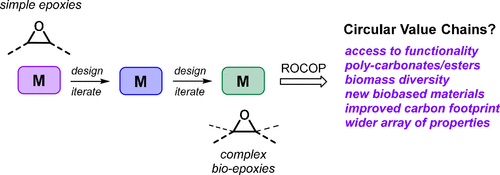当前位置:
X-MOL 学术
›
Acc. Chem. Res.
›
论文详情
Our official English website, www.x-mol.net, welcomes your
feedback! (Note: you will need to create a separate account there.)
Catalyst Engineering Empowers the Creation of Biomass-Derived Polyesters and Polycarbonates
Accounts of Chemical Research ( IF 16.4 ) Pub Date : 2022-06-01 , DOI: 10.1021/acs.accounts.2c00204 Arianna Brandolese 1 , Arjan W Kleij 1, 2
Accounts of Chemical Research ( IF 16.4 ) Pub Date : 2022-06-01 , DOI: 10.1021/acs.accounts.2c00204 Arianna Brandolese 1 , Arjan W Kleij 1, 2
Affiliation

|
The introduction of circular principles in chemical manufacturing will drastically change the way everyday plastics are produced, thereby affecting several aspects of the respective value chains in terms of raw feedstock, recyclability, and cost. The ultimate aim is to ensure a paradigm shift toward plastic-based (consumer) materials that overall can offer a more attractive and sustainable carbon footprint, which is an important requisite from a societal, political, and eventually economical point of view. To realize this important milestone, it is vitally important to control the polymerization processes associated with the creation of novel sustainable materials. In this respect, we realized that expanding the portfolio of biomass-derived monomers may indeed create an impetus for atom circularity; however, the often sterically congested nature of biomass-derived monomers minimizes the ability of previously developed catalysts to activate and transform these precursors. Our motivation was thus spurred by an apparent lack of catalysts suitable for addressing the conversion of such biomonomers, as we realized the potential that new catalytic processes could have to advance and contribute to the development of sustainable materials produced from polycarbonates and polyesters. These two classes of polymers represent crucial ingredients of important and large-scale consumer products and are therefore ideal fits for implementing new catalytic protocols that enable a gradual transition to plastic materials with an improved carbon footprint.
中文翻译:

催化剂工程助力生物质衍生聚酯和聚碳酸酯的创造
在化学制造中引入循环原则将彻底改变日常塑料的生产方式,从而影响各个价值链在原料、可回收性和成本方面的多个方面。最终目标是确保向基于塑料(消费)材料的范式转变,这种材料总体上可以提供更具吸引力和可持续的碳足迹,从社会、政治和最终经济的角度来看,这是一个重要的必要条件。为了实现这一重要里程碑,控制与创造新型可持续材料相关的聚合过程至关重要。在这方面,我们意识到扩大生物质衍生单体的组合可能确实会为原子循环创造动力;然而,生物质衍生单体通常空间拥挤的性质使先前开发的催化剂激活和转化这些前体的能力最小化。因此,我们的动机是由于明显缺乏适合解决此类生物单体转化的催化剂,因为我们意识到新的催化工艺可能必须推进并有助于开发由聚碳酸酯和聚酯生产的可持续材料。这两类聚合物代表了重要和大规模消费品的关键成分,因此非常适合实施新的催化协议,从而能够逐步过渡到具有改善碳足迹的塑料材料。
更新日期:2022-06-01
中文翻译:

催化剂工程助力生物质衍生聚酯和聚碳酸酯的创造
在化学制造中引入循环原则将彻底改变日常塑料的生产方式,从而影响各个价值链在原料、可回收性和成本方面的多个方面。最终目标是确保向基于塑料(消费)材料的范式转变,这种材料总体上可以提供更具吸引力和可持续的碳足迹,从社会、政治和最终经济的角度来看,这是一个重要的必要条件。为了实现这一重要里程碑,控制与创造新型可持续材料相关的聚合过程至关重要。在这方面,我们意识到扩大生物质衍生单体的组合可能确实会为原子循环创造动力;然而,生物质衍生单体通常空间拥挤的性质使先前开发的催化剂激活和转化这些前体的能力最小化。因此,我们的动机是由于明显缺乏适合解决此类生物单体转化的催化剂,因为我们意识到新的催化工艺可能必须推进并有助于开发由聚碳酸酯和聚酯生产的可持续材料。这两类聚合物代表了重要和大规模消费品的关键成分,因此非常适合实施新的催化协议,从而能够逐步过渡到具有改善碳足迹的塑料材料。









































 京公网安备 11010802027423号
京公网安备 11010802027423号